Prelude to a Vagrancy
July 9, 2008
Nothing ever really begins. Nothing ever really ends. It is only our minds that focus, linearly and without imagination, on the events whose order of observation we call the progress of time. Sitting in the Portland train station, the truth of this was as easy to see as the heavily tattooed young woman wearing a wife-beater, lounging on the bench across from me, her lithe body drawing the eyes of every male, and some females, in the station. To call this point the start of my journey was silly. To say that my travels began at this point ignored the obvious. I could not point to something and say, "Look, there it is! Everything began here." It would be closer to the truth if instead I said that for 34 years I had been beginning the trip that lead me to the Portland train station and the woman in the wife-beater. But this is no way to tell a story, which is much easier to relate if one disregards the clarity of reality and instead tells the tell in the way in which people are used to.
I was in the Portland train station waiting for the Empire Builder, a train that runs between Seattle or Portland out to Chicago, making stops along the way in places small and large. It follows the course of empire of our young country, from the industrial center out to the frontier via the High Plains. The train would take me through the night across Washington and Idaho and sometime in the morning would deposit me in East Glacier Park, Montana. More accurately, East Glacier Park, Blackfoot Nation. From East Glacier I would get on a shuttle bus that would drive me around and through Glacier National Park and into Alberta, Canada. The bus would leave me at Waterton National Park and I would be on my own for the next two months: I was going to walk back to the Pacific following a line just south of the Canadian border. There was a nominal route in the area called the Pacific Northwest Trail and I was planning to follow it where it seemed nice, and to follow my own path when I felt like it or when the land demanded that I detour elsewhere. Like to a town with a brewpub. When people asked what I was going to be doing this summer, it was easier to tell them that I was hiking something named. Having a name made it seem much less unknown, much less scary, much less dangerous, than telling them the truth: I was going out to the Rockies and then would wander back to the Pacific, living as I saw fit, for two months. I wanted to live with as little formal structure as I thought I could get away with. I wanted to drift, rather than do.
As the train rolled out of the station, I smiled at the people shacked up along the sides of the tracks, bicycles with carts behind them, flowing beards and patched clothes. Dirty. People that everything in society says have lost, as if life was a game with a score that one could play at. I wondered what they were going to do tonight. Maybe spend the evening picking through trash looking for cans to recycle for money. Maybe write a poem. Maybe get high. I thought about what I would do if I were they. But a more intriguing question was what they would do if they were me. Would they race back home and enjoy the comforts of settled living? Or would they stay on the train? Generalizations about people are for the worst kind of academicians, for they reduce individuals to the status of the herd and are passed off as a sort of science that makes even the ignorant laugh. I had no way of knowing what someone would do with my life if they suddenly became me, nor what I would do if I suddenly became them. Satisfied with this lazy bit of thinking, for it is supremely lazy to refuse to even think, I decided to tackle something more concrete: I opened my old copy of Mark Twain's Huckleberry Finn and cracked the top on the soda bottle of whiskey that I was carrying.
I wiped the drool from my mouth and chin with the back of my hand and wiped that onto my pants. A few deft picks with my finger nails removed the crusty bits from my eyes and no one seemed to notice when I farted and scratched myself. I had slept well in the normal chairs of the train, which never happens on an airplane, at least for me. It was nearly 6 am and I couldn't tell where I was, not that it mattered much. Somewhere nearing the western slope of the Rockies, judging from the trees. I took a long pull of whiskey and went back to sleep. There wasn't any reason not to sleep, which is one of the more delicious luxuries that people regularly deny themselves.
I awoke around 9 am with a pretty girl sitting next to me. She had come on board last night at Pasco, Washington, and was heading to Browning, Blackfoot Nation, for North American Indian Days. She had spent the night in the observation car where it was possible to lie down and rest in the normal fashion. Whiskey cures normal fashion. We talked for a while before the train began to pass through the scenic terrain south of the park and I found more stimulating modes of passing time. I heard the call and languidly picked up the black duffle bag containing the 11 pounds of gear that would sustain me for the next two months. I didn't want to rush this. I didn't want to hurry. Smoothly, I descended the stairs of the train car to the outside world and into the open air.
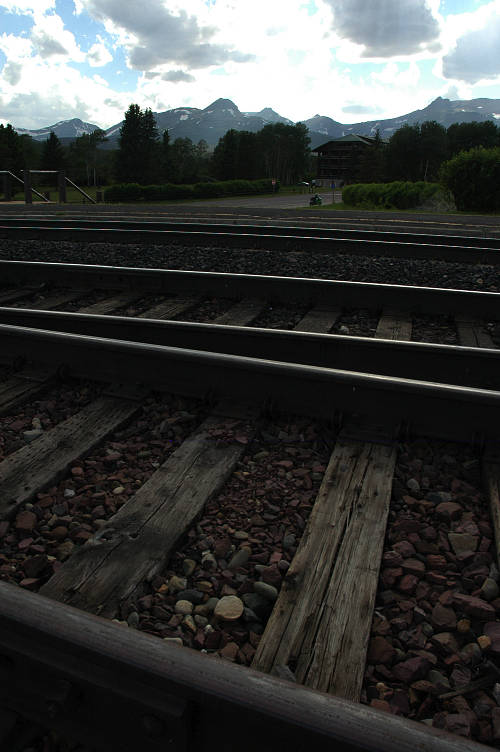
Three years ago I had come to this same place, but as a much different person. At the start of the summer of 2005 I had begun a long walk down the spine of the continent. My intentions were to hike from Canada to Mexico along the Continental Divide Trail. I was crippled mentally and spiritually and everything inside of me longed to be elsewhere. But the stupidity of a stubborn human is immense and I am more stubborn than is common. Under the mirror of solitude I turned myself inside out, finally leaving the trail in Wyoming and returning home to sort out what I could and apply the lessons that I thought I had learned. As it turned out, I had learned only some of those lessons, but those that I learned I learned well. It took another 10 months of suffering and joy before I fully learned what I should have known when I left the Divide. But none of this will make any sense to any one other than myself and, perhaps, another, and I write it only for posterity and for the sake of complete accuracy. I normally frown upon accuracy, as it gets in the way of telling a good story, which, after all, is the purpose at hand and the pleasure that I take. That, of course, is a lie, but it is a lie that I am happy to tell. Let me extricate myself from this wordswamp with a sentence that would have been quite adequate at the start and would have avoided all of this mumbo-jumbo: The town of East Glacier and I had a history together that made it significant in my life and I stepped off the train fully aware of this significance.

Not much had changed in the town since I was last here. The wind was still blowing and the mountains still had snow on them. I crossed under the tracks and wandered over to Serranos, a local Mexican restaurant in back of which is The Backpackers Inn. I had spent several days here in 2005 drinking strong beer and talking with a woman known in the hiking community as Blister Sister, whom I haven't seen since but who calls me occasionally when she's been drinking strong beer. Blister really helped me when I needed it and I'll always think of her fondly. I'm doing so right now. My stomach was fiercely empty and I didn't stop much longer than to think about Blister, pay my $12 for a bunk, and drop my gear. I wandered into the Two Medicine Grill, a few stores down and bellied up to the counter where two obvious hikers were sitting.
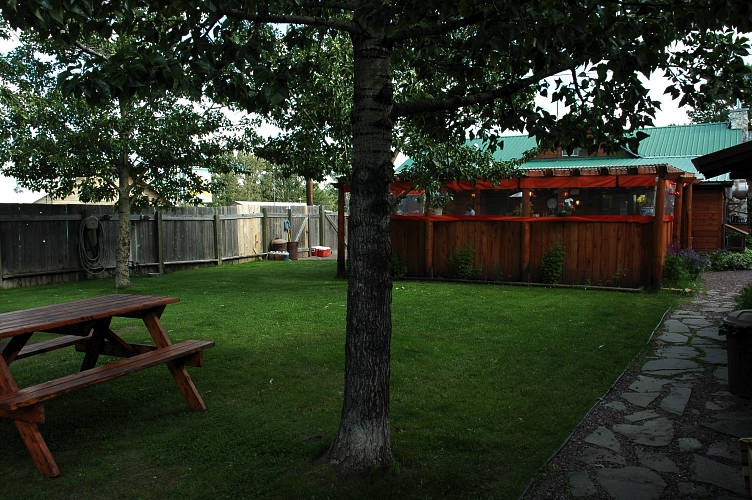
I didn't pay them much mind as behind the counter was the same pretty cook who had been here three years ago. She hadn't changed at all, which was good. Becca was skinny, but in an athletic, not waif-ish, sort of way. Her natural blond hair was pulled tightly back into a short pony tail. Her skin had was of a person who lives in the outofdoors as much as possible, which is to say that it had some use, but was healthy in that way that tanning salon skin is not. Although she looked like she was in her early thirties, I suspected she was younger than that. New since the last time was Heather, who had moved out to the area to try to find work as a wildlife biologist, but had not found much of promise and was moving back to Idaho in a couple of days. Stunningly beautiful with a devilish smile, she was exploding with energy and I did not think it had anything to do with me: She was just naturally bubbly, but not in an air-headed way. She invited me to her going away party that her and her boyfriend were putting on, but it wasn't for a couple of days and I wanted to get to Waterton and start my walk. I stayed for an hour talking with Becca and Heather, eating my omelet and drinking coffee and reading the paper and gawking at them. At some point the hikers, Walking Carrot and Nowhere Man, left to hitch back to Marias Pass and continue their hike south toward Mexico.
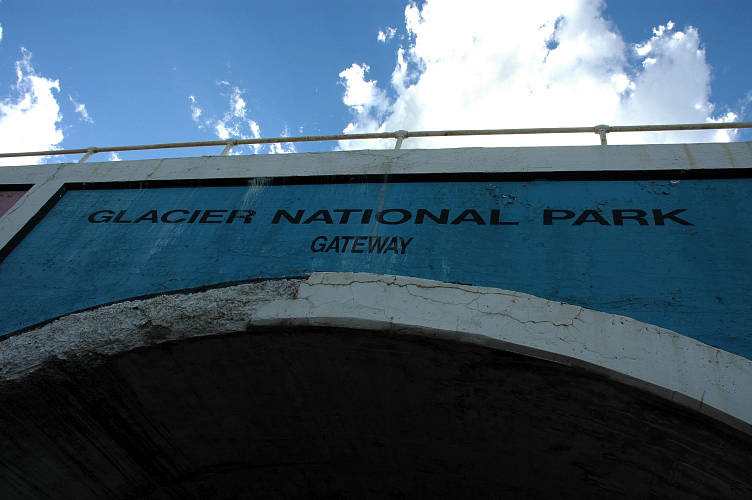
I returned to the hostel and changed into my hiker clothes, the only clothes that I would wear, except my birthday suit, for the next two months. White shirt, well stained from five years of hiking and climbing. Black stretchy pants. Running socks. Running shoes. I toted the train travel gear over to the post office and shipped it to Peter, who was dealing with my mail while I was gone. At ten minutes past noon, I no longer had anything to do with myself or with my time. Because of the celebrations in Browning no alcohol was being sold on the Rez, which meant that I couldn't sit around swilling beer in the afternoon and would have to find something more productive to do. I took a nap.
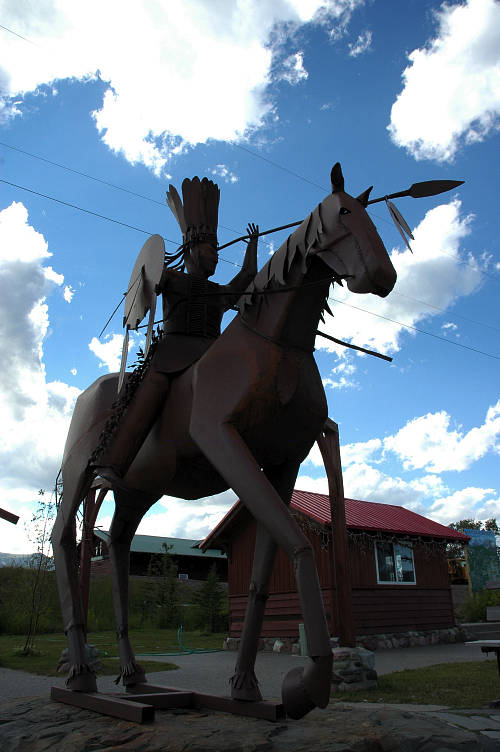
It was Steve's shoes that did it. Clack, clack, clack, went his shoes. I couldn't sleep through it and so opened my eyes. And there was Steve, in cycling regalia, complete with helmet and razor sunglasses, his clip in shoes making the clacking sounds. Originally from San Diego, Steve had graduated from college recently and moved out to Montana for the summer to take advantage of the mountain roads. He was an avid cyclist and spent most of his free time training on his bike, though I never learned what he was training for. It didn't really matter. He didn't want to get on the Track, at least not yet. He was working as a cook at the Lake McDonald Lodge, which is where those too poor to camp stay when the come to what might be the most beautiful park in the world's largest park system. By poor, I, of course, mean mentally poor, for the lodges are hideously expensive to stay in and only those with financial resources would be staying there. I suppose the $160 a night rooms are cheap in comparison to a luxury suite in the Cayman Islands. The ill, feeble, and old need a place to sleep when they come out to their Land.
Steve had cycled from the lodge over Going to the Sun road and down to East Glacier, a considerable distance. Tomorrow he would cycle back and start work again the day after. Steve and I talked about hiking and cycling and my upcoming trip. People like Steve are easy for me to talk to because I don't have to explain why: Why are you doing this thing? Some people understand, which is fortunate because I don't know how to explain it in words, much less in a soundbite. We continued the conversation over dinner at Serranos and then Steve disappeared and I went out in search of Heather, who told me she lived behind the grill in a brown trailer and that I should look her up if I was bored. I found the trailer but no one was at home. I drank the rest of my whiskey and wandered about town with nothing in particular to do. A truck carrying something dangerous crashed and rolled just outside of town, shutting down US 2 in the direction of Browning, which is where everyone wanted to go. Slightly buzzed, I stood along side of the road and watched the traffic back up, for no better reason than that I had nothing else to do. Eventually I tired of doing nothing and went back to the hostel, where I wrote in my journal for nearly an hour before turning to my attentions to Huck and Jim. They were starting out on an adventure down a river, the conclusion of which was uncertain, and were without fear or worry about what the future might bring. Both were searching for the freedom and unsettled life, of life beyond civil society, where they could live as they saw fit. We need more people like Huck and Jim, even with all their problems, biases, superstitions, defects, downsides, pronunciation issues, body odor, prejudices, ignorance, pettiness, and other traits that characterize the human race. We need them for the same reason that Thoreau needed Walden. We need them to remind us what life is and, more importantly, what it is not.
Steve was gone when I awoke in the bunkhouse. For some reason they close to cyclists a part of the road he needed to take to get back to Lake McDonald and he wanted to get through before they did. When I run the park, I'll shut down the road at times to cars. It is probably a good thing that I'll never run the park. I dressed and wandered over to the grill, where Heather and Becca were flying around the restaurant in a frenzy of activity. The place was packed but we managed a few words as I sat at the counter. I thought about staying another couple of days for Heather's going away party, but was pulled in another direction, to another place. I still had some traveling to do.
Breakfast done, finished off with seven cups of coffee, and the paper read, I wandered back to the hostel to pack and rest. Mostly, I just sat and did nothing. I sat for an hour and looked at the wall, quite contentedly. I wasn't thinking or meditating or pondering or wondering or otherwise engaged. I just sat and looked at the wall, without restlessness, nervousness, boredom. And then I got up and walked over to the East Glacier Lodge (complete with golf course) where the shuttle bus left from. I was riding it all the way to the other end of the line at the Prince of Wales hotel in Waterton. Oddly, I didn't feel anything for the tourists milling about the hotel. Not compassion or pity or loathing or superiority. They were just there, and I was just here. I felt nothing toward them. An older woman and her friend were driving. The only other passengers were two young men from the Czech Republic who were working for another lodge this summer and needed a lift there.
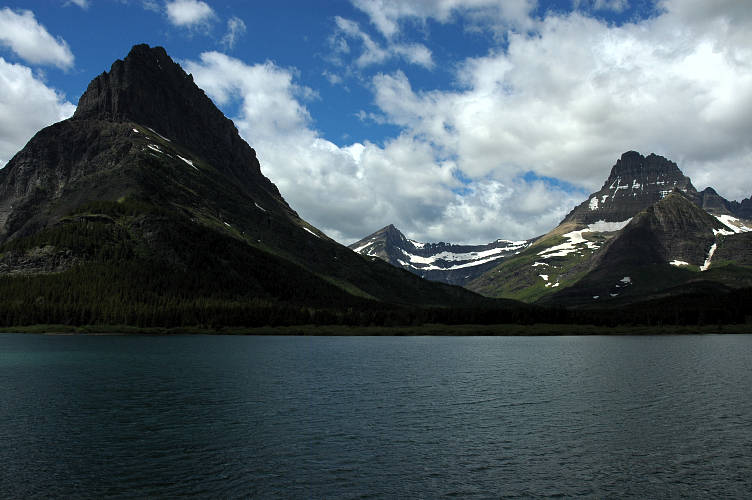
The driver was pleasant and worked occasionally as a tour guide in the park. She would drive the big, red busses that tourists ride to hear an interpretive history of the park. Such and such a thing happened here at this time. Such and such a person did this, that, and the other thing, making person XYZ happy or sad or mean or glad. I even learned something new: Why sashes were tied on certain trees alongside the road. I'd tell you, but you should really just go to Glacier and find out for yourself.
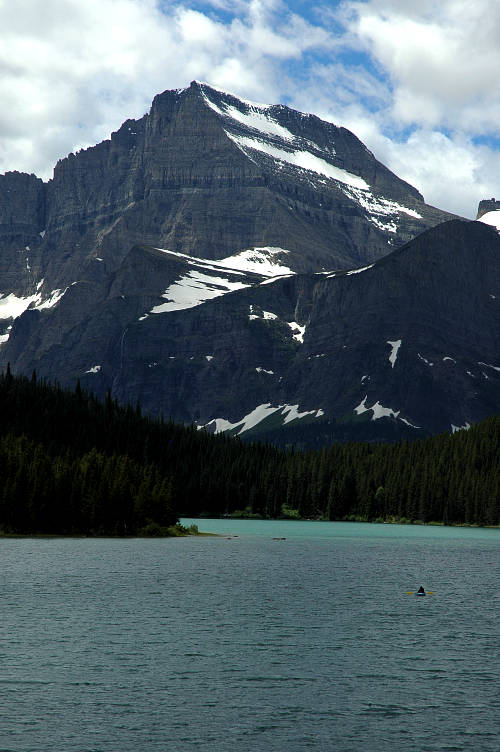
We made a long drive into the park, where I had to pay $12 for the privilege of driving in, then driving out via the same road. I offered to get out and sit by the side of the road until the shuttle returned, but such things were not normally done, I was told. We drove to yet another lodge, where the Czechs got out, and where we sat for thirty minutes. I took some pictures and wandered around. I even bought a cup of coffee for $3. The workers, the grunt workers at least, of the lodge were really interesting. Perhaps 70% were from a country other than the United States and the rest looked like they were working in the park for reasons other than employment. I would imagine that being from, say, Indonesia, and working as a waiter in the lodge would be a very interesting cultural experience. Of course, I think I would hate American tourists after a summer of such work and hatred is not a good thing to grow.
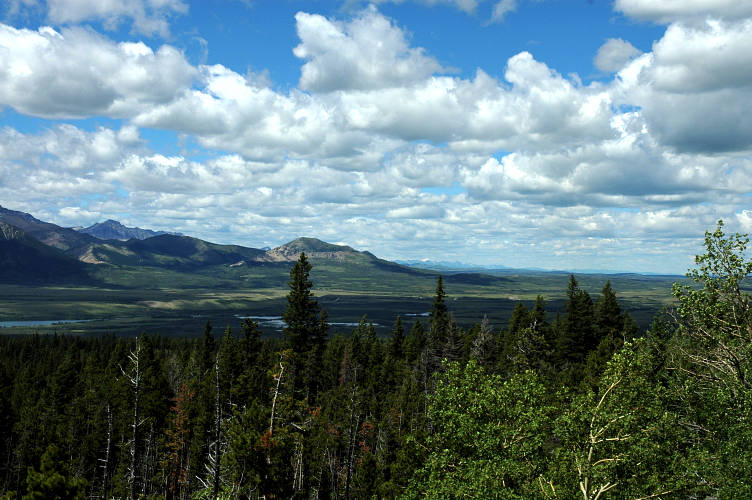
Back in the bus, we had two new riders. Backpackers, in fact, complete with heavy packs. The two young men were hiking in from the Chief Mountain traiihead, where I came out three years ago, down to East Glacier via the continental divide. We dropped them at the trailhead and then crossed the border into Canada, which is only a few yards from the trailhead. The views of the land took on the proportions that I especially like in this part of the world. Hanging glaciers and soaring peaks are fine, in a scary sort of way, but even better is to be able to see Transition and Space. We were east of the Divide and stretching for, oh, perhaps 1200 miles was nothing but high plains. A vastness that is hard to understand unless you've seen the ocean from the ocean, or actually wandered out to the plains and prairie. This huge geographical feature was ending right here: These were the first mountains that the westbound traveler would have faced. It was a point of transition, from plain into mountain. I would complete that transition during my time: Cross mountains, enter the transmontane zone, climb through the Cascades, and then down to salt water and rain forest. At a view point, we could even see the start of my route: The Prince of Wales hotel and the deep valley that I would hike up to cross back into the United States.
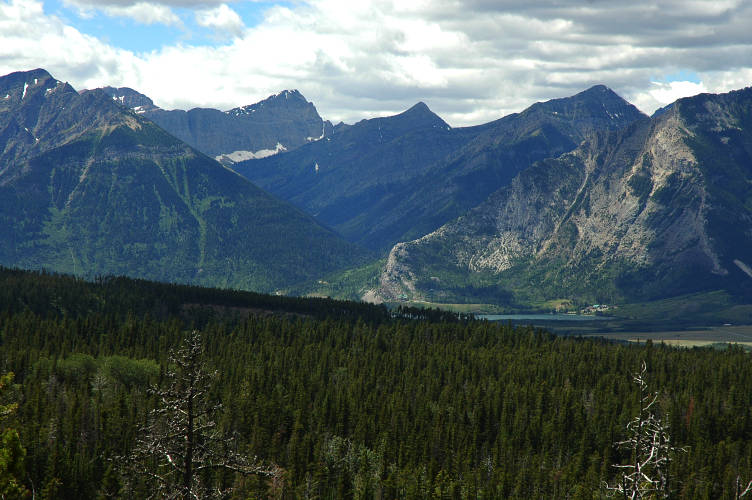
The driver dropped me at the Warden Station rather than the Prince of Wales hotel so that I could secure a permit for the one night I would be spending in Glacier National Park. The staff at Waterton work with the staff at Glacier to deal with cross border hikers like myself. Although it would seem counterintuitive, the system actually works really well and is done without computers: One person calls another person and they work things out. I paid my $5, got my permit, and left, calm like a bomb, as Zach might say. I was finally free. I hummed a tune as I walked down the street, fully aware of the freedom that I now had. Giddy. I had no more trains to ride, buses to catch, fees to pay. I had no more responsibility other than to stay alive and to enjoy the time that I had. The idea that I didn't know where I was going to sleep tonight, that this was a problem that I would have to solve, was especially appealing to me. As I walked down the street, I kept my eyes out for nice places where I'd be able to camp for the night out of sight of people who might want me to sleep in a designated place, like the campground. On my traverse of the Canadian Rockies I had spent the night in a picnic shelter and was able to avoid the $24 camping fee. I had no intention of paying this time around.
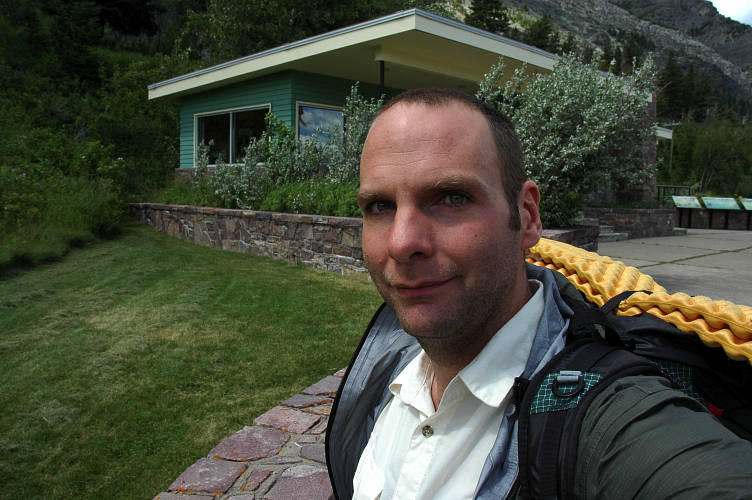
I smiled at all the tourists shopping for trinkets in the townsite, not annoyed by their complacency. I bought some cheap lunch meat and cheese along with some beer and rum and made my way to the campground. Packed. The signs at the entrance station said that it was full, even the "Walk In" site. Having been in Canada before, I knew that "Walk In" meant that you parked your car and walked 20 feet to your camp, which is just a big expanse of grass. Unlike the US, where most parks have designated, low cost or free camping for those on foot or cycle, Canada wants everyone to pay the same, regardless of how much machinery they are dragging with them. It didn't matter that it was full. Since I didn't have a car, I had to sleep here. I suppose they could arrest me for vagrancy and then deport me, but that idea was rather appealing to me and would make a good story.
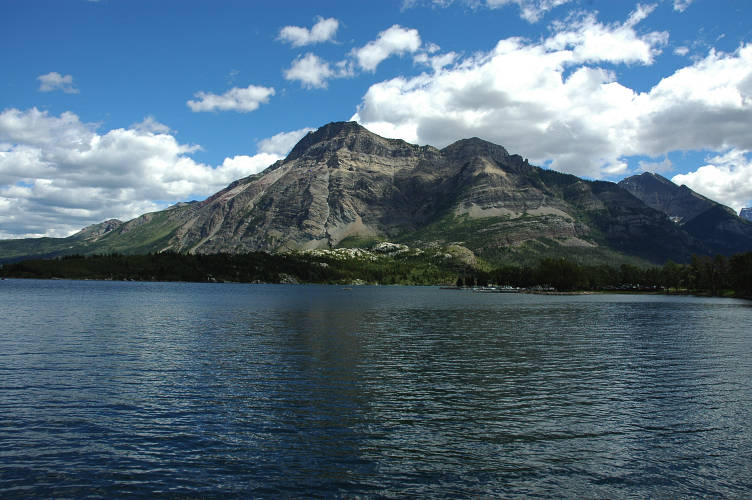
I walked past the entrance gate and its attendant and into the camping around. Past the RVs and trailers and rigs. Past the 19 person tents and portable swimming pools and satellite dishes. I crossed over the outflow of Waterton Lake and into the Walk In area. It was, indeed, quite full, and resembled more of a party at a rock concert than a campground. I found an empty picnic shelter and made some meat and cheese sandwiches, minus the bread, and drank some beer.
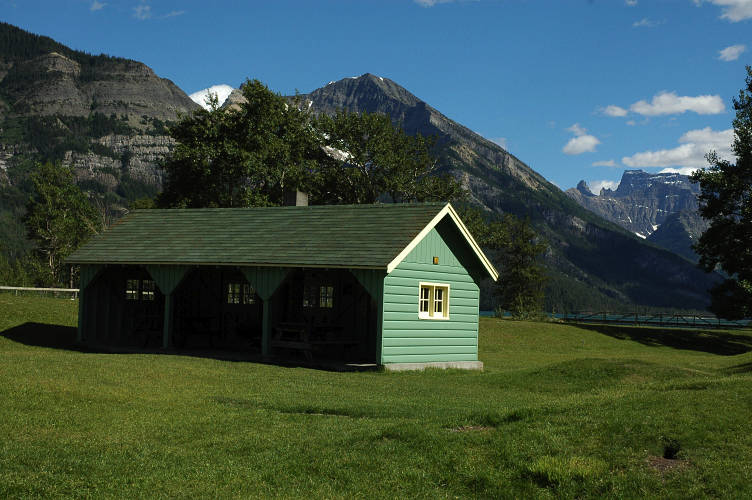
I ate my meat and cheese roll ups and drank the six pack of beer over the course of a few hours, watching the revelers do their thing. Not one of them was planning on doing any exploring of the park. A couple of campers had bikes rigged for travel and they might be doing something interesting, but I was happy sitting on the bench watching. Around 6 pm a woman in a golf cart pulled up to the edge of the camping area, a sure sign of a camp host out to check to make that everyone has paid and is following the rules. Play nice. I discreetly packed up my empties and slipped out the other side of the area. I walked into town and plopped down at an outside table of a cafe that didn't look too objectionable. But looks can be deceiving: The cheeseburger a travesty and the over priced beer tasted just like Bud. The french fries turned out to be tater tots. But I was able to spend another hour of daylight there. I still had three hours of light left, so I migrated to the lake where I could watch the sun dip down. I read a few pages of Twain and sipped rum on the sly, but mostly I just sat.
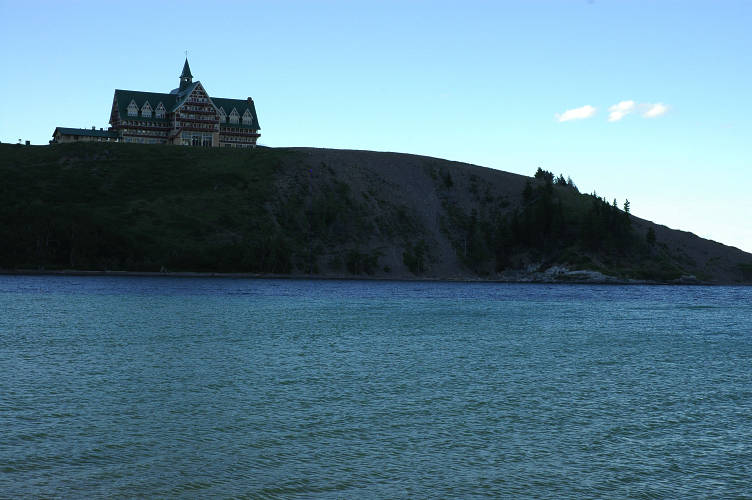
As the sun slowly went down, I walked back toward the camping area at a good, slow pace: I took two hours to walk the quarter mile. Of course, I wasn't just walking. I was stopping and sitting and drinking and swearing at the deer. And looking at the mountains and water and feeling the grass and smelling the air. I got back to the camping area near dark and was shocked at how full it was. Nearly all the grass was camped on and the party was going strong. No sleep would be had here. Plus, there was a RCMP patrol car with its lights going. It couldn't possibly be looking for me, but I thought that I should move on anyways.
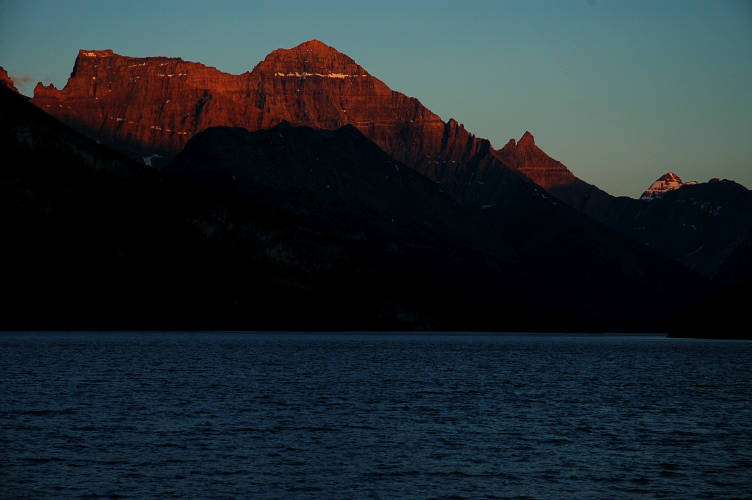
I went back to the lake and sat for a while before traversing on the far side of the camping area to a small, sheltered cove where I could sleep on the beach out of sight and out of the way. As a general rule, if you can't be seen from a road, you won't be seen. Hosts and staff generally won't get out of their car to look for stealth campers, though golf carts have a bit more mobility. My palace was perfect, but unfortunately some of the revelers wanted a bit more space and soon a party was going on the lakefront about fifty yards from me. It was quite dark by now and I threw a few rocks at them before moving back from the lake where it was a bit more quiet.
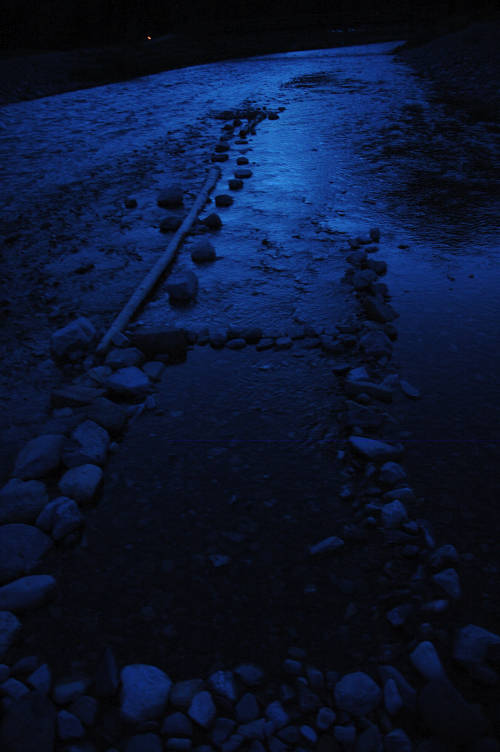
I found a picnic bench in the middle of a field of tall grass where it was quiet, dark, and secure. The stars were bright overhead. Looking at stars always makes me think. What choices had I made that had brought me to this point at this time? It was the time thing again. Thinking of life as a sequence of choices doesn't seem to reflect how we come to be. A discrete, linear progression can be analyzed by methods that now seem to be the only ones available to us. But thinking of existence more as the flow of a river, as a continual evolution, makes more sense. Where does a river begin? Where does it end? The Columbia starts in the Rockies and ends in the Pacific. But where does the water come from? From rain and snow. Where did that come from? From evaporation of water into the air. Well, where did that start? Does the river actually end when it gets to the Pacific? Trying to break up my past into chunks and then to call each chunk by a name and ascribe certain properties to certain chunks, saying that one chunk is the cause of this event and this chunk combines with this other one to cause this other thing, to do this, to digitize your past and your life and existence is to ignore the whole. It is trying to learn about a forest by studying trees. I sat on my rectangle of Tyvek and looked up at the stars, thinking about why I came to be here. It is a pointless question, like the river thing. I set it aside in favor of a better question: In the next two months, what can I do to evolve and how can I retain this when I return to settled life? The stars were there, in the black sky, casting their light down from millions of years in the past, in one continuous stream.















